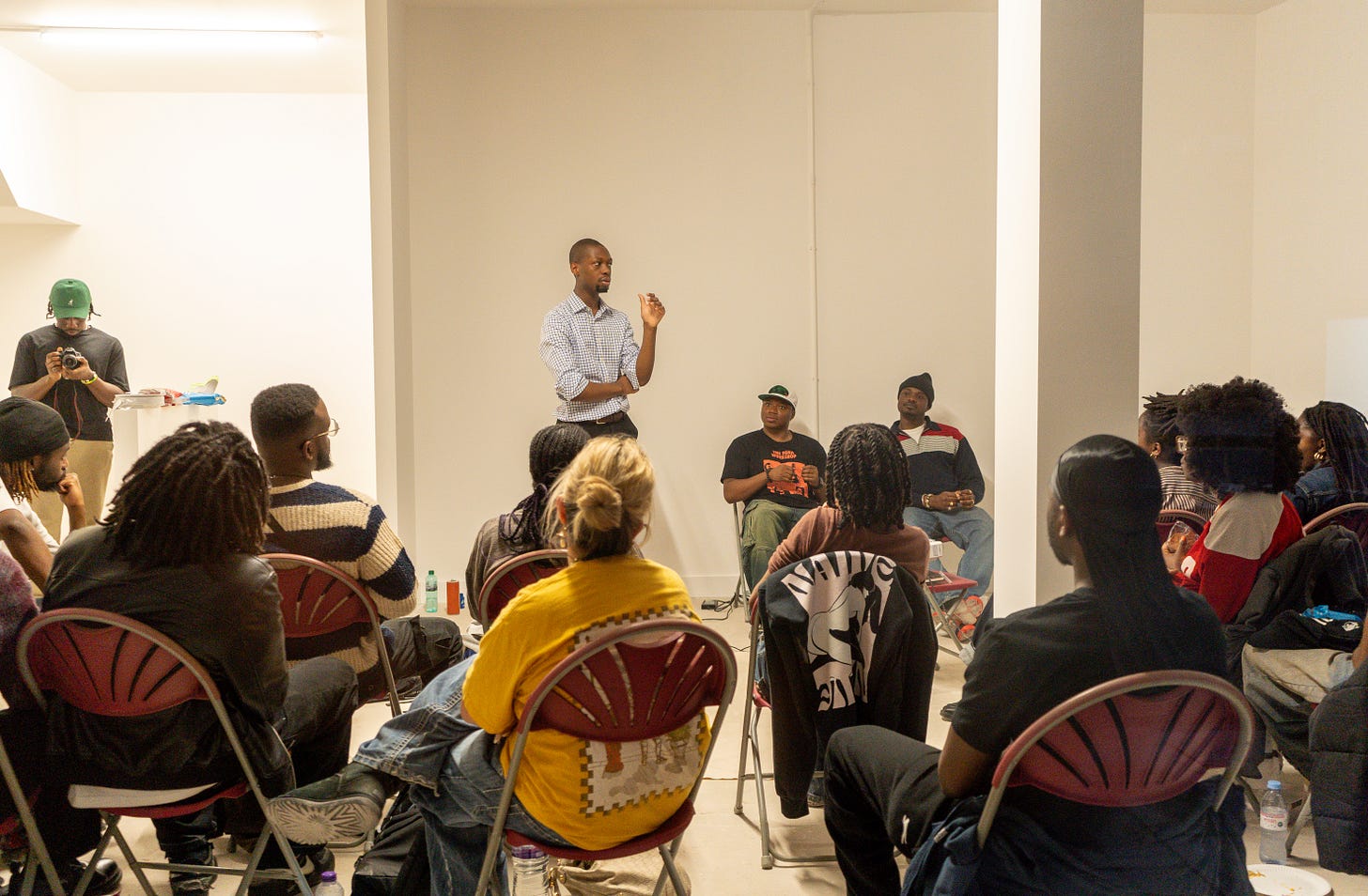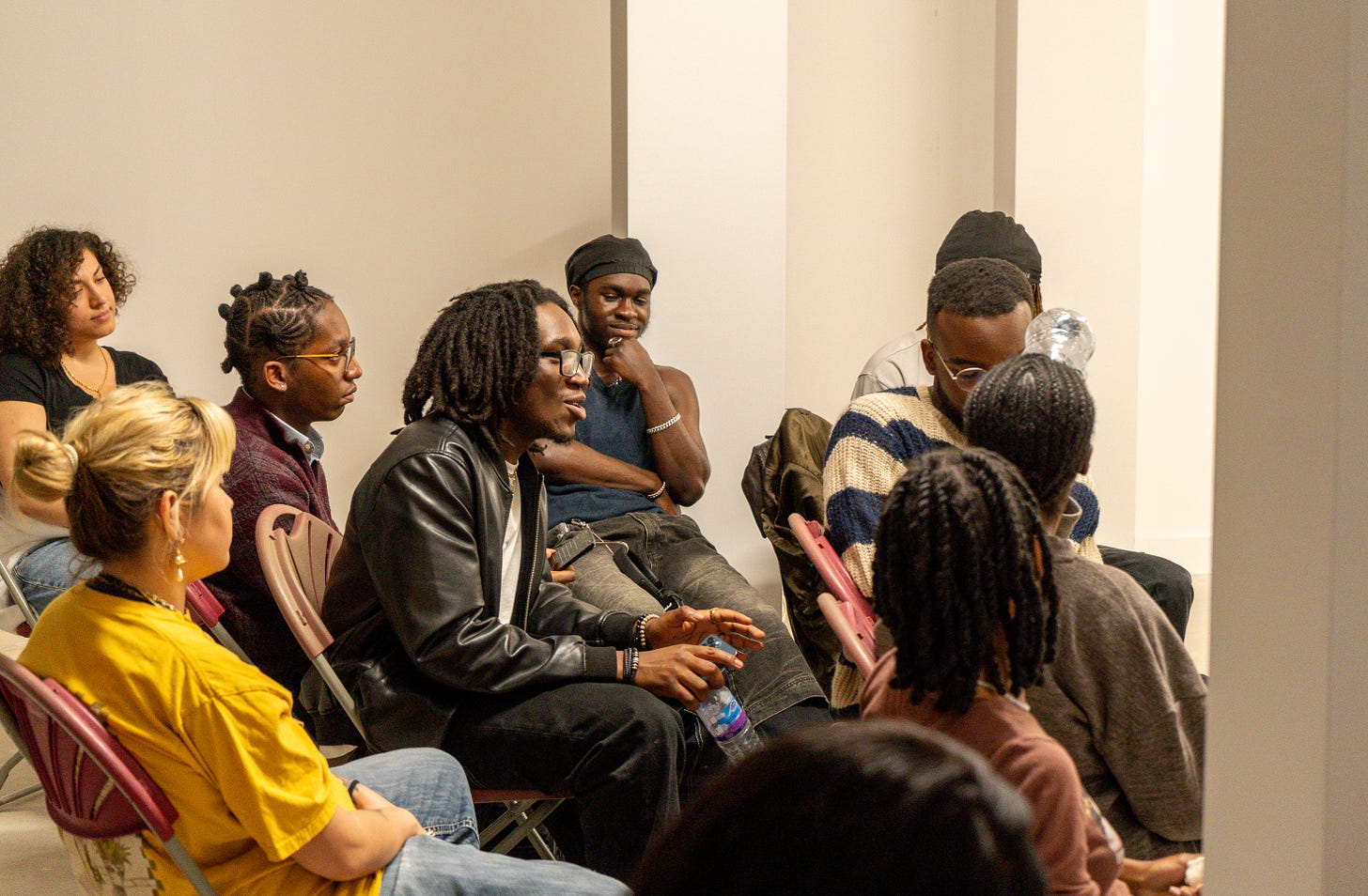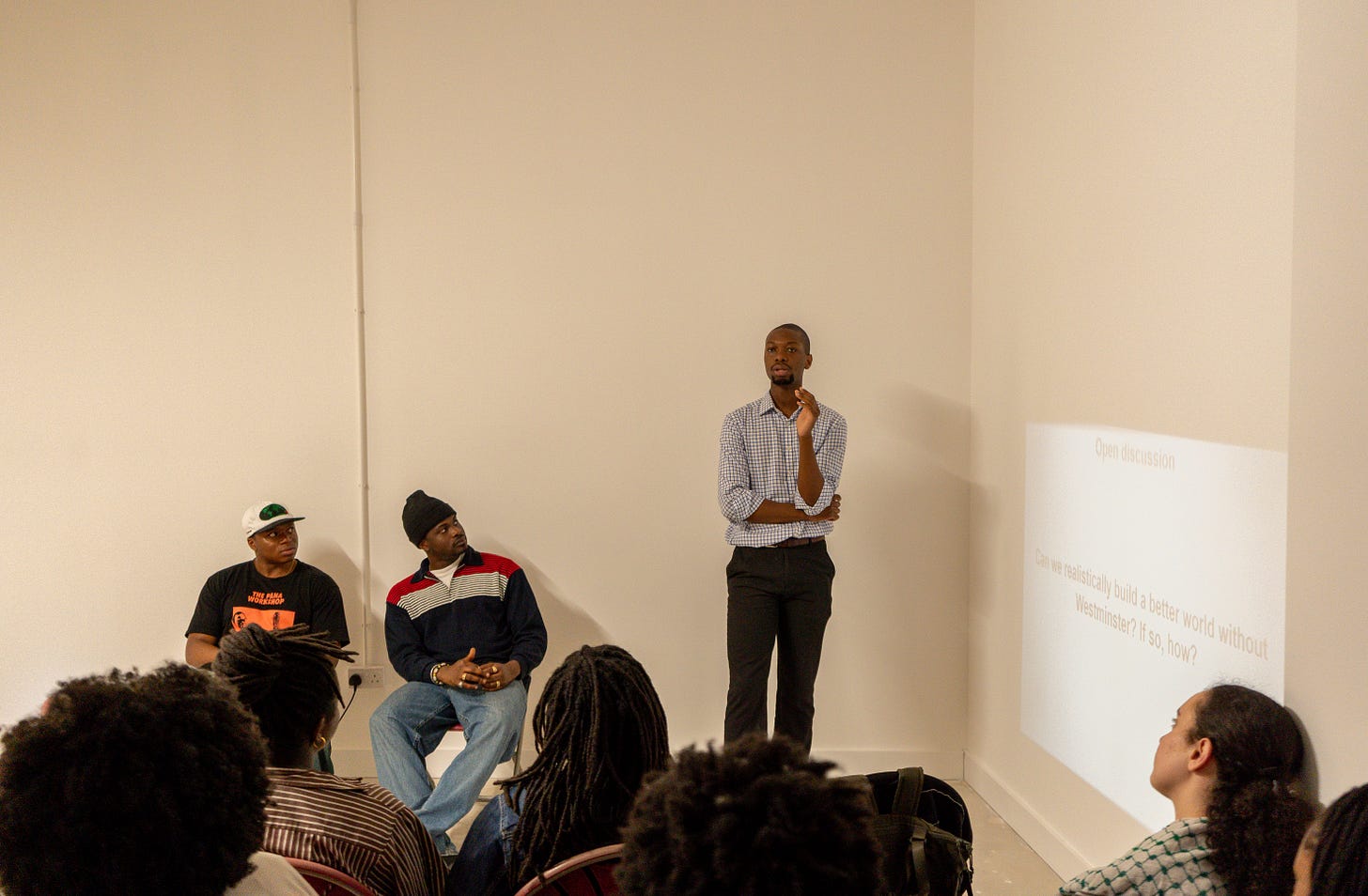This general election feels to many to be the bleakest in our lifetimes. Our taxes are paying for the genocide of innocent civilians in Gaza, housing is unaffordable, the NHS is in disrepute, the cost-of-living is skyrocketing exponentially and neither of the two main parties seem to be promising real solutions to these problems.
‘What Are The Options?’ was a town hall organised to facilitate a discussion in the face of this helplessness. The goal was to explore the options we do have at the ballot box on July 4th and to think of ways that we can live as a conscientious collective moving forward. Through donations for ticket sales, this event raised £91.38 for Darfur Women’s Action in Sudan.
These minutes include a transcript of the discussion and resources shared from it. The transcript of this conversation was adapted from shorthand notes taken by the venue owners at Space and Purpose, who provided a space to us freely for the evening.
Panellists:
Panel discussion transcript-
Given the candidates we have, what would be your ideal outcome for the election?
Gabriel: To me, I think the most ideal outcome would be a repeat of the 2017 election.
Initially, that election crushed me, Jeremy Corbyn was mobilising the young generation and they all came out to vote for him. Then, he lost to Theresa May, so it felt like it was all for nothing. But I’ve grown to appreciate that outcome because Theresa May lost her majority there and it made it very difficult for her to maintain control over the Houses of Parliament thereafter.
In parliament, you have a specific number of seats and when your party has a majority, it means that you can win any motion you put forward there as long as your party members vote on the same side as you. But because Theresa May had no majority, it wasn’t guaranteed that her party would immediately win motions and the other parties were able to hold her accountable in parliament by voting to block her decisions. She had to actually frame policy decisions in a way that reflected the viewpoints of all the different constituencies represented in parliament to get her decisions to pass.
And because of the massive turnout of young people in that election for the Green and Labour Parties, all of the parties included more climate solutions in their manifestos at the next election because they realised it was such an important policy for people.
That’s what we want now.
Keir Starmer is going to win. We know this due to the polls but we hope that independent candidates- especially pro-Palestine ones- will win more seats in order to lessen his majority. So that his party will have to think logically to develop proposals that all of our representatives will agree on.
Tito: I can’t even imagine a good outcome for the average working class minority or for LGBT+ people. I can’t see a way that there is a good outcome, without severe resistance.
In politics there’s the ‘Overton Window’ - which is essentially the parameter of acceptable ideology. For example, the Conservatives might say, “we hate dogs”. Then Labour might respond with “we hate dogs, but not as much”. So it means the main two parties have only allowed conversations in the media landscape to exist within those parameters. A way this reflects real issues is how Tories act on migrants. They’ll base their whole campaign on deporting migrants and then Labour will say it's bad because it's too expensive, not that it shouldn't happen. So then the whole conversation within this window centres around the question of: “how do we deport migrants efficiently? Rather than critically engaging with the policy and questioning if it’s bad.”
When other parties have larger support, there are more than two options - not just one option with different fonts. So we really need to open the Overton Window.
Both parties are dead and Starmer doesn't even have his own ideas.
I hope that the Green Party, the Left-wing of the Labour Party, Dianne Abbott, Jeremy Corbyn and all the independent candidates continue to vocalise themselves - to show a broad variety of options.
Gabriel: I really want to highlight the Overton Window because the way politics works is that no ideas exist outside of that window.
I was reading recently about an idea called concision1, which is essentially the idea that you’re only allowed to build upon existing ideas in the mainstream media landscape rather than introduce new ones. An example is that we’re allowed to publicly call ISIS a terrorist organisation without scrutiny (rightly so), but you’re not allowed to then say that the West have been complicit in the creation of such terrorist organisations and have committed war crimes akin to terrorism in the Middle East, because that exists outside the scope of acceptable mainstream opinion.
I’m mentioning this because I recently did an event with TheBooksDem at Boxpark Wembley where we explored the question ‘Is the current media landscape progressive?’ and I said no because as black people we don’t even own mainstream media platforms or have any control over which mainstream messaging is acceptable and which isn’t.
We need to create platforms that are dynamic and instil a sense of empathy, so it’s really important for us to create things that we can call our own rather than these external institutions. I hope this general election pushes us to be aware of that.
Edward: I wish it was possible for us to vote for the Scottish National Party.
I would have liked the Green Party but they put out a statement recently about October 7th, which was a bit anti-Palestine. They have called for a ceasefire now but I can’t stand fence-sitters.
I want more independent candidates to come in.
I think the options are really dire right now, but things need to be a nightmare until they’re not.
It’s really important that you read your ballot and familiarise yourself with your councillors and your constituency [outside of this election]. Let's break the paralysis.
Gabriel: I think it’s really important that we situate independent candidates within their historical context.
I remember in 2020- we were all 2020’d up and looking for an out from the way things were at the time so I decided to read about the Black Panther party and their history to learn about the solutions they had already proposed in their time. I stumbled upon a book called Just Another Nigger. It’s the personal memoirs of Don Cox, who was their field marshall.
At the end of the book, it mentions that Eldridge Cleaver, one of their leaders, was running for president, and I couldn’t see any logic as to why he would do that.
I realised later that sometimes standing as a candidate is not about winning the election but about putting ideas on the ballot box. When people go to vote for independent candidates, they’re co-signing the ideas these candidates stand for and sending a message to the establishment that it’ll lose votes if it doesn’t adapt to the public’s will.
There’s a radical black academic in America called Cornel West. I was shocked when I saw that he announced himself for 2024’s US Presidential election, but he’s putting important issues on the ballot box.
Here in the UK, we have Fiona Lali, who’s standing in Stratford and Bow. She’s promising to dismantle capitalism and stop the war in Gaza, which is very cool. We don’t necessarily know how she’s going to get there but the important thing is that she’s just putting these opinions on the ballot in the first place.
Then of course we know Jeremy Corbyn and Dianne Abott.
There’s George Galloway. I don’t think he’s a good role model, but he’s been a vocal advocate for the people in Gaza and Rishi Sunak was so shocked at his win that he called a press conference about it! His victory sent the right message.
Tito: Lianne Mohammed in Ilford North too
Gabriel: Yeah, exactly! There are loads of options, please research candidates!
Is there any hope in Great Britain after the next election- specifically, are the next 5 years destined to be bleak?
Tito: There are a multitude of factors…
I’m trying to find the positives, but I’m failing.
Keir is benefiting from the collapse of the Tories. He is being lent the vote. This is no permanent shift to ‘Starmerism’ because there is no clear principle that Starmerism stands on. I encourage you to even look for one policy that Keir Starmer has been consistent on.
A big crisis will come in the next 5 years. We’re blaming the Tories for the state of our country so we’re turning to labour but it will not solve what we need. It will not fix the NHS or the economy. There’ll be no solution from Keir, so people will again start to look elsewhere.
Because of the Overton Window, everyone’s ignoring the effects of cuts that both parties are working towards. Cuts are imminent, and we’ll see the effects of that on our public infrastructure.
There’s very little faith in the left in this country and we need something to address that. Corbyn was the best we’ve had but he had a lack of killer instinct. We need something stronger when going against capitalism, which makes fertile opportunity for a movement of some kind to come.
Audience member: Does this election change the binary then?
Gabriel: No, because for that to happen there have to be other options outside of the current binary and we don’t have any serious, competent alternatives.
Tito: The way Keir Starmer has moved is so dangerous. He has taken out the left of the Labour Party and has brought the party to the centre but isn’t actually offering any solutions to real problems in the meantime.
We need to be ready for a powerful far right movement coming.
Gabriel: Yeah, that’s true. A few months ago, the right-wing of the Conservative Party held the ‘National Conservative Conference2’ and the policies they were proposing were frighteningly fascist, almost Nazi-like.
Audience member: People forget how racist the UK is. You mentioned at the beginning that the election that impacted you was the 2017 election. Well, for me, it was the 2010 election that led to the coalition government because that resulted in the increase of tuition fees and the Lib Dems moving to the right and Thatcherism being weaved into society.
And I know what you guys are saying about Corbyn but I think we should give him a little more praise because he gave us hope and he gave us something to believe in.
I think in these community grassroot spaces we need to discuss how to not root our politics in consumption. Our liberation is not in DEI programmes. There needs to be real organisation and unity amongst the left.
Edward: I agree. I think we should look to the folks in the uni encampments at the moment. They’re setting an example for us. I don’t know how many of you have gone to visit them but I have and one thing that stands out to me is the discipline. Those kids aren’t just having fun and partying. They have clear rules: no alcohol, no drugs. They really know what they’re there for. And they’re always stocked up on supplies, resources, essentials.
This shows that organisation on the left is not impossible. We need to help them, so if you can donate to make sure they’re nourished and have the things that they need, you should.
The politics of hope is needed now more than ever. It's bleak but we need to push.
Which policies do you think people are most concerned about?
Tito: The biggest problem across the UK is the cost of living crisis. Majority of Britons are one paycheck away from becoming homeless and we can only see it getting worse.
Gabriel: I think that statistic came out before the pandemic, pre-2019 so it must have gotten much worse now.
Tito: Yeah, exactly. The other biggest discussion is Gaza, which is not being included in the election conversation. My mum even speaks to me about the situation in Palestine right now. I thought I would have to educate her on this issue but she was already aware so this is something that a lot of people are talking about.
The NHS is another big problem.
You would think it’s a crime to fund public policy infrastructure.
I’m really concerned about the impact this is having on people’s lives. We always talk about how our health service is the best in the world and how great it is to have free healthcare but we can’t boast about the NHS anymore. I don’t know if you’ve realised but a lot of people are just living with small problems. They don’t even have hope in the NHS, so small injuries and pains: they just make do with them.
Audience member: They don’t talk about the cost of living and where our tax money is going!
Edward: I work in schools and so I think schools are a big problem right now. Teachers are doing a million roles because they’re understaffed. So many schools are closing and the kids are suffering.
The NHS is another big problem…
Audience member: I think there’s so much that we let slide in this country and it’s always the things that people think don’t affect them that do. For example, this country has a massive transphobia issue. There are so many healthcare rights that are being stripped away from trans people and we forget about the precedent that is set with things like this. Because it starts to affect our access to certain procedures and rights too.
Tito: You start to see how they begin by experimenting on subsections of society with horrific policies. There’s the CASS report3, for example.
Gabriel: I have a summary from the main parties policies on Gaza, the NHS and housing:
Gaza
Conservative4
-Have publicly expressed solidarity with the Israeli government in their war with Gaza
-Would like to see a deal wherein Hamas return the Israeli hostages
-Not open to recognising Palestine as a state but are keen to consider a two-state solution
Context: A third of Conservative MPs are funded by Israeli lobby groups
Labour5
-Claim to want peace between Israel and Palestine
-Want to work towards a deal
-Want to see Palestine recognised as a state once Israel deems it permissible to do so
Context: The Labour Party have repeatedly made it the party line to vote against a ceasefire and senior party members believe that Israel has the right to defend itself by cutting access to electricity and water to civilians in Gaza
Liberal Democrats
-Want a ceasefire
-Want a two-state solution
Green Party
-Want a ceasefire
-Want to stop Israel’s spread of violence to neighbouring states such as Lebanon and Egypt
NHS
Conservative
-Pledge £1b to the NHS to cut GP wait times
Context: The Conservative party have contributed to the gradual privatisation and decline of the NHS over the past 14 years. In 2023, the Conservative Party received £800,000 from private healthcare firms.
Labour
-40,000 more weekend and afternoon appointments paid for by non-doms6
Context: The Labour Party have publicly been very vocal about supporting the NHS but they’ve used terms like ‘modernising’ to describe their proposed approach, which is known in politics to be a dog whistle for privatisation. Wes Streeting, Labour’s Health Secretary has accepted numerous donations from American insurance firms, which coincides with growing discussions in the UK about scrapping the NHS for an American style insurance system.
Liberal Democrats
-Promise to improve social care by making it more accessible for patients and better paid for social care workers
-Want to increase the number of available hospital beds
-Will prioritise community mental health support
-Want to recruit more paramedics
-Want to introduce a community notice board to make ambulance wait times transparent
Green
-Will attempt to reduce strain on the NHS by making society healthier (i.e. less pollution, healthier diets etc.)
-Will decentralise healthcare to local governments
-Will offer free social care to the elderly in Scotland
Housing
Conservative
-WIll make it easier to buy the freehold of a property
-Will introduce a renters reform bill that offers more powers to renters and commits landlords
Labour
-Will introduce a renter’s charter
-Promise to tackle the supply side
Liberal Democrats
-Promise to introduce 150,000 social homes by the end of next parliament
-Promise to improve renter’s rights
Green
-Pledge £145bn grant to retrofit all houses for insulation
-Plan to give local authorities the power to impose rent controls
-Promise to introduce 150,000 more social homes by bringing empty homes back into use
Resources-
You can find the full party manifestos here: Conservative, Labour, Liberal Democrats, Green
You should also do research on the independent candidates standing in your constituency. You can do that by searching putting your postcode into this site and looking at the options available to you there
Politics is not limited to electoral parties. You can also get involved with politics yourself through organisations who are tackling key social issues such as:
Further Reading:
Insurgent Empire by Priyamvada Gopal
Just Another Nigger by Don Cox
Capitalist Realism by Mark Fisher
Discourse on Colonialism by Aimé Cesaire
The ‘non-domicile’ status is one that allows immigrants to live in the UK without paying full taxes. Rishi Sunak and his wife have been criticised for taking advantage of this





